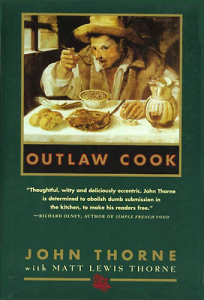Thanks to everyone who grabbed hold of our latest Cook the Books selection,Outlaw Cook by John and Matt Lewis Thorne, and submitted such great posts for our roundup. We certainly covered a lot of culinary terrain in our posts.
And a hearty thank you to our Guest Judge, our featured author himself, John Thorne, for stopping by to read our submissions and select a winner. He was most gracious and in his emails to me noted that “This is going to be very hard. I’m blown away by the thoughtfulness (and generosity) of all the writing and the adventurousness of the cooking.”
He went on to say:
“It was a very interesting experience: I thought you’ve gathered together some very good readers and very good (and imaginative) cooks. Also, I don’t get much of a chance to learn about the experience readers have when they read one of my books. I found it hard to believe that OUTLAW COOK is approaching its twentieth birthday! — perhaps because the food your participants chose is essentially timeless.”
And the winner of this Cook the Books round is……………….Claudia of Honey from Rock. Claudia’s now a three-time winner of our little CTB contest and her post about backyard bread baking, Romanesco cauliflower and Lasagna Cacciatora is interesting indeed. Congratulations Claudia!
I will now pass the CTB torch to another Hawaiian buddy, my friend and co-host, Deb ofKahakai Kitchen. She will be here soon to officially kick off our next book round, featuring that toothsome children’s classic, Charlie and the Chocolate Factory by Roald Dahl and I’m sure I’m not alone in looking forward to rereading this scrummy book.








